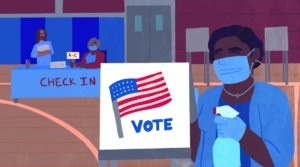Having the Right Skill Set for your Poll Workers
Seems simple, right? Determine how many poll workers you need for each election site and schedule them. Yet, it’s not quite that simple, is it?
 We need to have the right people, in the right places, at the right times.
We need to have the right people, in the right places, at the right times.
We need to have a good mixture of experienced and seasoned experts with new up-and-comers.
We need to have knowledgeable workers in various areas of specialties. You want a healthy mix of “seasoned pros” with “future superstars”, keeping your funnel full.
You need to have poll workers with proper language proficiencies present to help voters have full access to the voting process in geographies with a variety of spoken languages.
How do you set up your systems to schedule for this and track this?
You’ll need a system which identifies and records each poll worker’s training and election experience, with an evaluation of their proficiencies. Then, as you schedule each poll worker, you would clearly see the experience and proficiency levels at each polling location.
Honestly, relying on spreadsheets won’t easily do this for you.
There is an approach available, right now, which hundreds of localities are using every day, allowing Election Directors to gain insight and make better staffing decisions. It’s called Integra.

Hiring
Integra follows each poll worker through their hiring, training and election work, noting their proficiencies and experience. As a part of maintaining institutional knowledge, having notes on the decision process for hiring is a good practice.
Do you collect 
the important information you will need for the future, right at the beginning. Such as:
- Which is their home precinct?
- Which is their preferred precinct to work?
- Which languages do they speak?
- Do they have access to reliable transportation?
- Collecting payroll information, such as I-9, W-2, Driver’s License information
Integra also reflects the training taken by each poll worker – their attendance, if they passed and their proficiency level in each area / role of the polling place. You also can schedule each poll worker for early voting, election day and processing time. Communication with poll workers, confirming their training and election schedules, is all built in. Pulling reports, to help you schedule or see who needs training, is a breeze.
Skill levels
As you schedule your team for each voting place, you can see the skill levels and experience they bring to the table. You can balance and manage how each voting location is staffed. It’s wise to be building your bench – providing a healthy mix of seasoned workers with future super-stars. You can also use the analysis of skill levels to identify training needs.
Training
Is your training based on “how we’ve always done it?”
Certainly, there are core training modules and materials which must be presented. Yet, I’d suggest the data may help you train better. How many of your poll workers speak a language which is prevalent in your area? Is your training provided in this language? Do you have a large number of poll workers who might retire soon and have you identified those coming in behind them? How are you preparing your training for these?
Is your online training stored in a safe and secure place? Integra offers a safe repository for training.

Integra can help you gain clearer insight into your poll worker staff, allowing you to have a better voting location experience. You can have this in place before your next election! Click here to schedule a demonstration and to find out more.